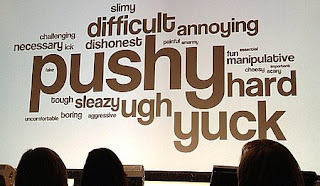 I was listening to a recent Dan Pink lecture as part of the
Authors@Wharton series. He said three things that just struck a chord.
I was listening to a recent Dan Pink lecture as part of the
Authors@Wharton series. He said three things that just struck a chord. - The first was that 1 in 9 US workers are in Sales.
- The second was that for all workers, on average they spend 41% of their time in a “sales-like” mode (defined as convincing or persuading people to give up something they value for what you can offer).
- The third was that the profession of sales has a stigma attached to it – see the nearby word cloud.
OK – so #3 is no big surprise, but the first two were. I’m
not sure I know what I thought the numbers would be, only that these stats are
larger than I expected.
So what does that have to do with being a Sales Engineer?
Well – no question that we are in sales and it is our responsibility to assist
the salespeople in “making the sale”. It’s a question of how we go about it.
The great thing about being an SE is that you have immediate trust and
credibility – at least relative to your sales partner. All else being equal, if you and
the rep walk into a room, who is the customer more likely to believe? Exactly!
You!!
That trust comes at a steep price in that you can never
afford to lie or mislead a customer, or even give the perception of doing so. What
is interesting is that very often the questions that may trip you up are not
technical in nature (the “do you support iOS 6.1?” type) but are business
related. The trust test is with a
question like “will this really work in my environment?” or “will this really
save me all the money he says it will?” or the infamous “can you get this up
and running in 6 weeks?”.
Your customer will believe you (at least the first time) –
so be careful what you say and how you say it. I joke that you know you are an SE when everyone in the room turns to look at you after the rep finishes speaking - but take the test of trust seriously.
John:
ReplyDeleteyou are so right about the questions asked and the self-imposed pressure to answer those questions "off the cuff". Thatis a tough situation that requires discipline, especially for the new SE, to manage properly.
If there are many instances where "operational issues", e.g. "...can this be installed in 6 weeks...", come into play then there is another imporatant close relationship that should be tapped, Operations, or the installation and maintenance resources of your company. Of course, if you don't know in any situation, say so. The big valuable differentiator is that you follow up and communicate back with the customer in a timely manner.
Leon